Long Night of Research
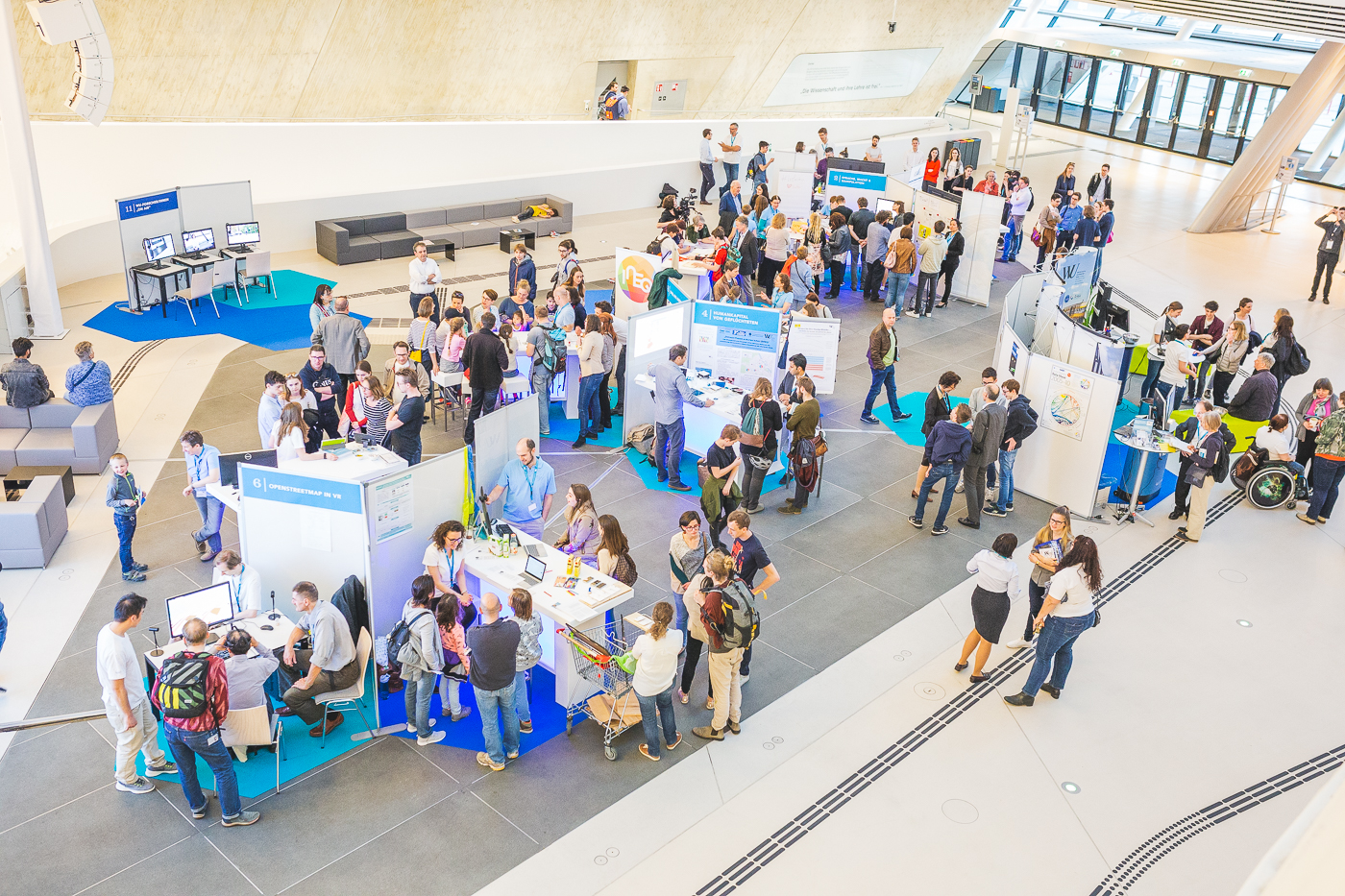
“What makes us rich or poor?” “Can we explain the world with data?” or, “How can we make getting old better?” These are just a few of the questions WU’s approximately 1,600 researchers deal with on a daily basis. They investigate what makes our society tick and what we can do to secure a positive future for everyone. For WU’s first Long Night of Research on April 13, researchers created interactive stations on their fields of work to make economic sciences accessible and comprehensible to visitors.
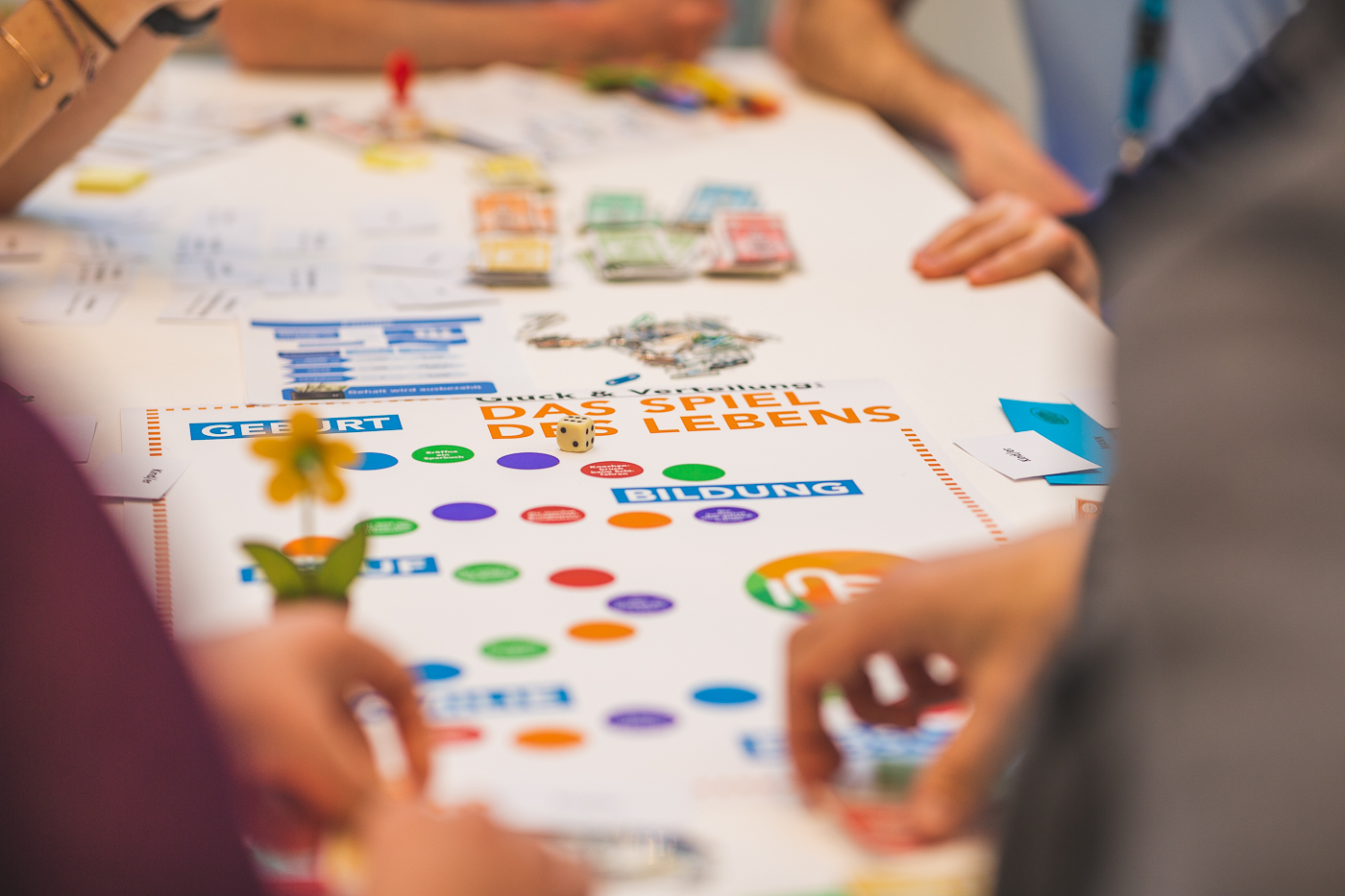
1,600 people of all ages took advantage of the opportunity to get a behind-the-scenes look at WU’s research. They mastered the cargo bike obstacle course, played the Game of Life, tested smart home technology, explored virtual worlds, and engaged in intensive discussions with our faculty. One especially prominent visitor was Margarete Schramböck, Austrian Federal Minister for Digital and Economic Affairs.
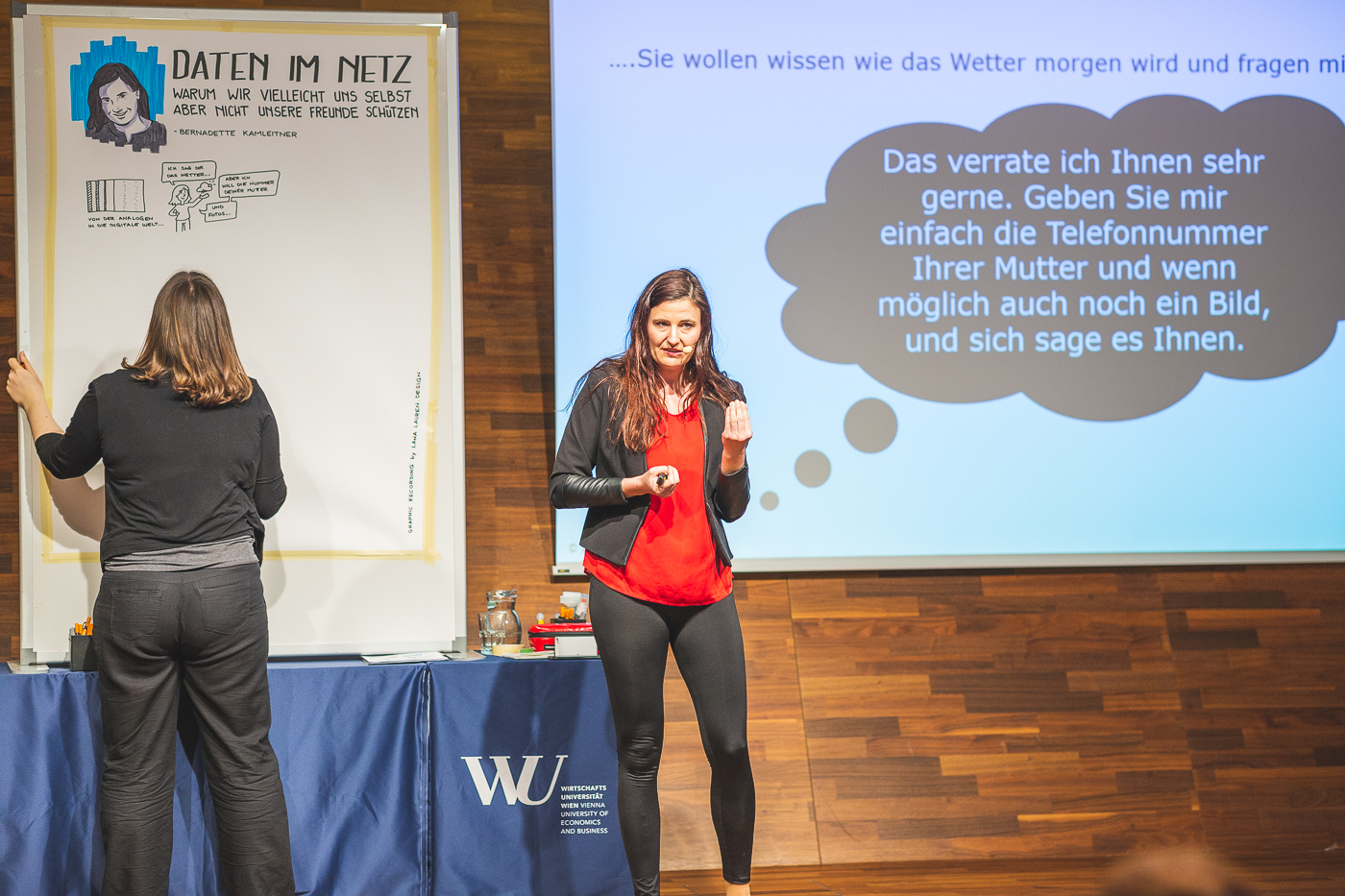
The public lectures were also very well attended, and covered the topics of blockchain technology and individuals’ responsibility for their own and their friends’ personal data. After the lectures, a panel of prominent experts discussed how refugees can be successfully integrated into the job market. Guided tours of Campus WU and the library rounded out the evening’s program.
Public Lectures and Discussions
Events like the Long Night of Research and the Children’s University give WU an opportunity to present itself to a wider audience. For more in-depth insights into current research and its relevance for business, economics, and politics, WU also organizes public lectures and panel discussions in its ‘WU matters. WU talks.’ series. In 2018, 4,725 people attended a total of 23 events to discuss important topics of the day with WU’s experts. The diverse palette included topics such as the power of language, blockchain technology, big data, organizational models for the digital age, and criminal law in the context of terrorism prevention.
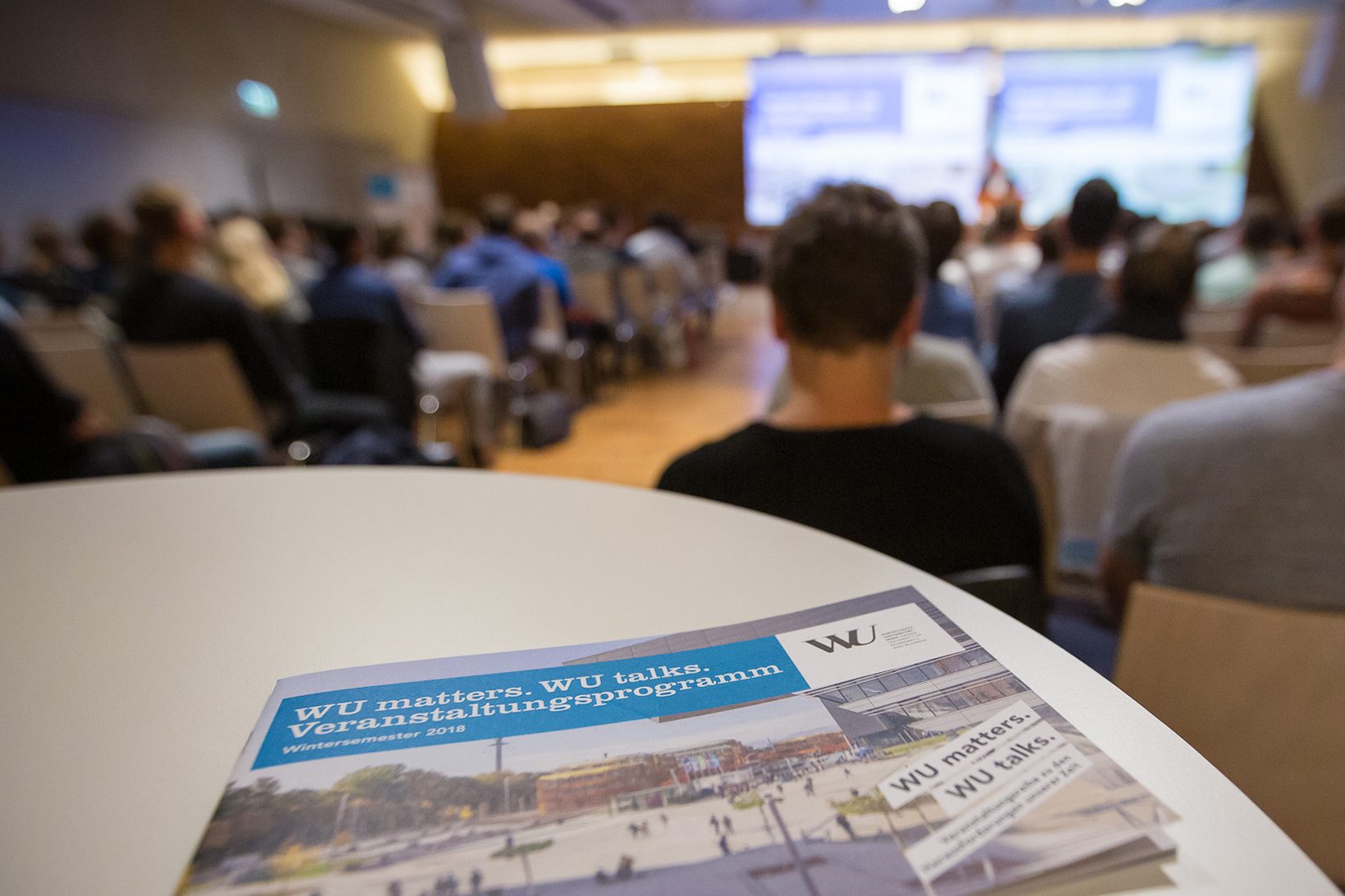
WU matters. WU talks. 2018 Events
Franz Marhold (WU)
Public lecture (Department of Business, Employment and Social Security Law)
Gerlinde Mautner (WU)
Nadine Thielemann (WU)
Public lecture (Department of Foreign Language Business Communication)
Ben Greiner (WU)
Patricia Klarner (WU)
Sabine Herlitschka (Infineon Technologies Austria AG)
Public lecture (Department of Strategy and Innovation)
Robert Pfaller (University of Art and Design Linz)
Bernadette Kamleitner (WU)
Ingolfur Blühdorn (WU)
Verena Madner (WU)
Panel discussion (NachhaltigkeitsKontroversen)
Ronald Hochreiter (WU)
Nadia Abou Nabout (WU)
Peter Bosek (Erste Group)
Public lecture (Wirtschaft Wissenschaft Unplugged)
Johannes Koll (WU)
Erhard Busek (Institute for the Danube Region and Central Europe, former Vice Chancellor)
Klaus Taschwer (Der Standard)
Ferdinand Lacina (former Minister of Finance)
Elisabeth Orth (actress)
Public lecture for the Commemorative Year in honor of the Jewish students, faculty, and staff exiled from the University of World Trade (WU)
Wolfgang Brandstetter (WU)
Severin Glaser (WU)
Robert Kert (WU)
Andrea Lehner (University of Vienna )
Public lecture (Department of Public Law and Tax Law)
Tina Wakolbinger (WU)
Jürgen Kunert (Austrian Red Cross)
Martina Kainz (Jugend Eine Welt)
Edith Rogenhofer (Doctors Without Borders)
Panel discussion (Department of Global Business and Trade)
Aida Hajro (WU)
Markus Stelzmann (Tele Haase)
Jürgen Weibler (Fern-Universität Hagen)
Michael Müller-Camen (WU)
Panel discussion (Department of Management)
Shermin Voshmgir (WU)
Hermann Erlach (Microsoft Austria)
Guido Schäfer (WU)
Public lecture (Wirtschaft Wissenschaft Unplugged)
Tina Wakolbinger (WU)
Robert Oberndorfer (Caritas Socialis)
Robert Pienz (Schauspielhaus Salzburg)
Panel discussion (Open Minds)
Andrea Grisold (WU)
Karin Bauer (Der Standard)
Florian Klenk (Falter)
Claus Reitan (freelance journalist)
Panel discussion (NachhaltigkeitsKontroversen)
Romana Gschiel-Hötzl (Raiffeisenbank)
Walter Rothensteiner (Österreichischer Raiffeisenverband)
Markus Stegfellner (Genossenschaft für Gemeinwohl)
Johann Strobl (Raiffeisen Bank International)
Panel discussion commemorating the 200th birthday of F. W. Raiffeisen
Christopher Lettl (WU)
Julia Stone (Billa AG)
Alexander Pilarski (RWA AG)
Christian Lüdtke (etventure)
Werner Hoffmann (WU)
Panel discussion (Open Minds)
Christoph Badelt (WIFO, WU)
Michael Lang (WU)
Public lecture in cooperation with the Austrian Institute of Economic Research
Alfred Taudes (WU)
Niklas Reisz (WU)
Vladimir Garbeshkov (WU)
Walter Mösenbacher (Raiffeisen e-force)
Stefan Pichler (WU)
Panel discussion (Department of Information Systems and Operations)
Bodo B. Schlegelmilch (WU)
Public lecture (Department of Marketing)
Hikmet Ersek (Western Union)
Heike Mensi-Klarbach (WU)
Panel discussion (WU Manager of the Year)
Sigrid Stagl (WU)
Karlheinz Kopf (WKO)
Public lecture (Wirtschaft Wissenschaft Unplugged)
Jonas Puck (WU)
Public lecture (WU Best Paper Awards ceremony)
Armon Rezai (WU)
Klaus Prettner (Universität Hohenheim)
Jesús Crespo Cuaresma (WU)
Jessica Jewell (International Institute for Applied Systems Analysis)
Panel discussion (Department of Strategy and Innovation)
Harald Kunczier (Österreichische Post AG)
Ulrike Prokes (student WU)
Martin Klokar (student WU)
Clara Ernst (student WU)
Nicholas Pacher (student WU)
Podiumsdiskussion (WU Center of Excellence)
Anke Hoeffler (University of Oxford)
Jesús Crespo Cuaresma (WU)
Public lecture (Department of Economics)
Summer Celebration
WU invited students, faculty, staff, partners, and local residents to the third annual Summer Celebration on June 14. The celebration’s motto was “5 years of Campus WU.” 7,500 guests were in attendance to celebrate the end of the academic year, and enjoyed a fun evening with delicious food, refreshing drinks, and great music. The Austrian hit bands Folkshilfe, Möwe, and Simon Lewis rocked the campus, and the up-and-coming new band The Chaos Circle played as the opening act.
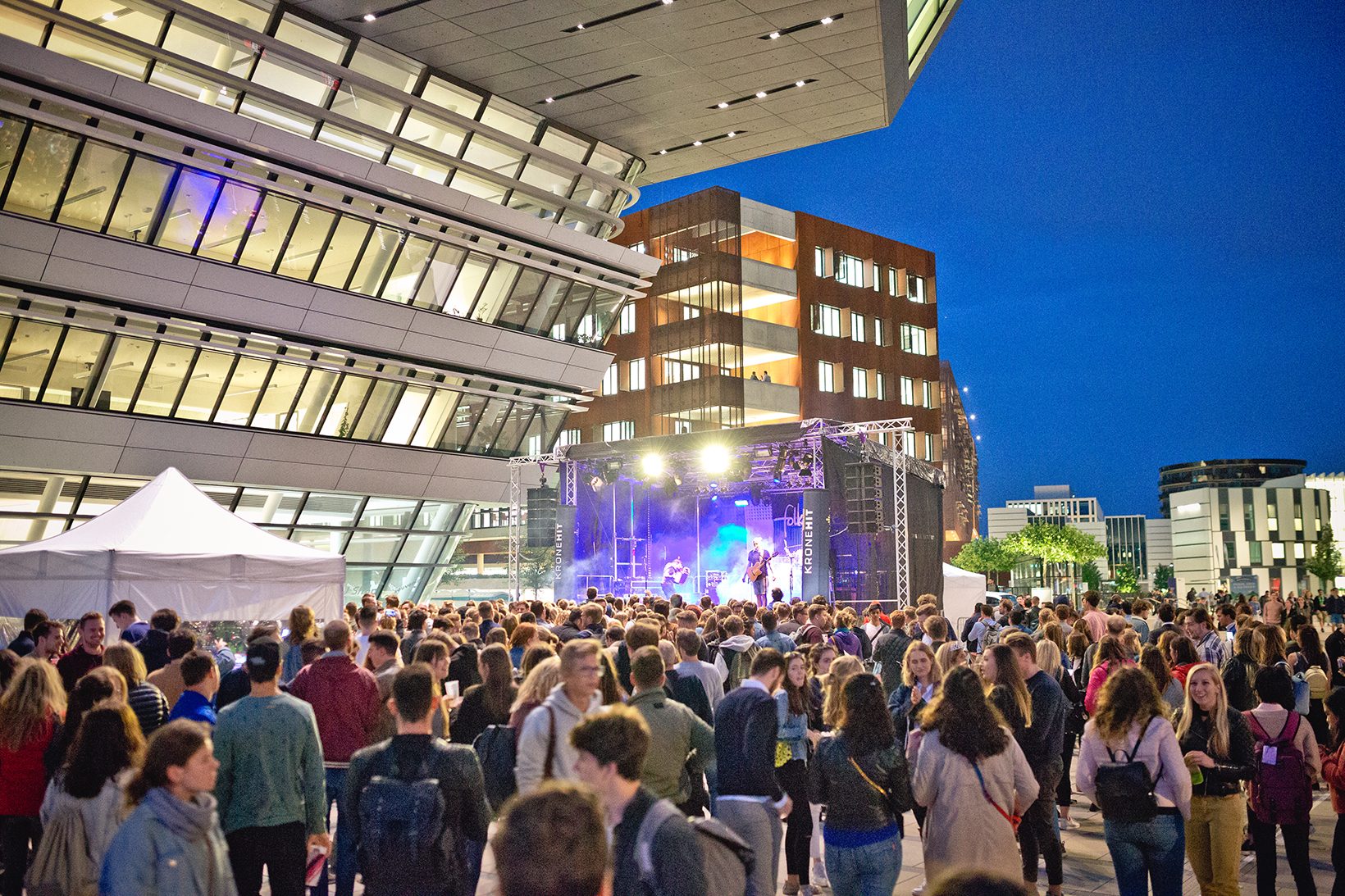
Children’s University
In July, the fourth Children’s University on Business and Economics was held at WU. With 31 different courses to choose from, the young scientists set out to discover the world of research in the economic sciences. They learned, for example, how the most important inventions of the last 100 years have changed the world, created surveys, drew diagrams, took apart computers, and explored how humans, their environment, and the economy are connected. All courses were booked solid.

